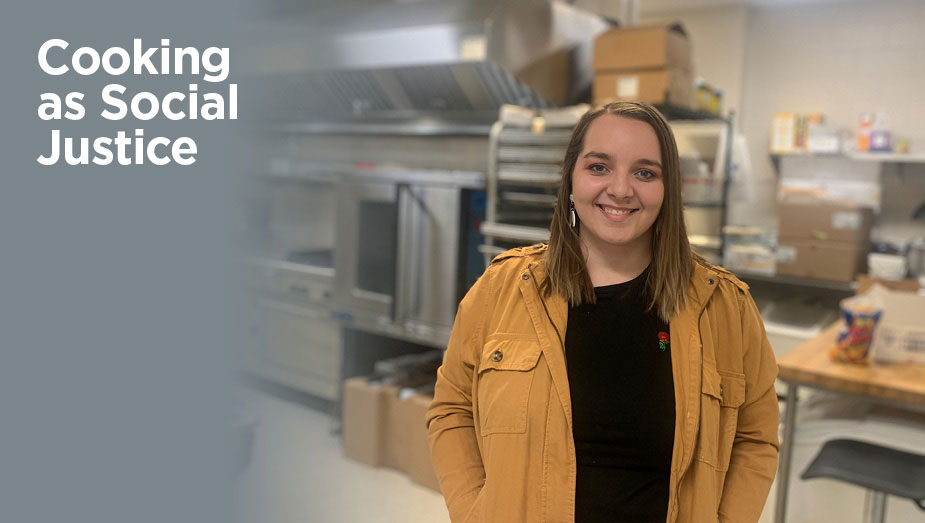
Cooking as Social Justice
Miriah Krochak packed a lot of career experiences into her first seven years out of high school, from food truck cook, to baker, to café manager, to graduating at the top of her class from Saskatchewan Polytechnic’s Culinary Arts diploma program. But one of her most rewarding, and challenging, experiences has been the last two years as food services manager at The Lighthouse Supported Living in downtown Saskatoon.
“I started at the Lighthouse in 2018, right out of school because I saw an opportunity to make a difference,” Miriah says. “Food security is a real issue for the people who come to the Lighthouse. There are people in our community who don’t have enough food, including kids - that’s hard to know, especially around Thanksgiving.”
Miriah has always loved cooking but says the idea of a career in cooking started in her teens. “My dad was diagnosed with cancer when I was 15, and I wanted to do something, anything, to help. I started cooking for our family, and I remember thinking, this is something positive I can do; I can feed people.”
After landing a job managing a local café when she was just 19, Miriah realized there was much more to a career in cooking. That’s when she enrolled in the Culinary Arts program. “I learned so much in the program, things I wouldn’t know otherwise,” she says.
“I loved the hands-on experience. I’ve never really enjoyed sitting in classrooms, so being able to go to school and be hands-on, cooking every day, was great. That was my favourite part of the program, learning by doing.”
“Miriah was always one of the top students in every class,” says Paul Wheeler, Culinary Arts program head and one of Miriah’s instructors. “She’s intelligent, dedicated and her marks were always sky high. We were so proud to see her apply her skills at the Lighthouse. She’s using cooking to promote social justice.”
But, Wheeler adds, it’s not just her cooking skills that are making a difference. “Miriah makes a huge effort to make food a positive in people’s lives. She’s always looking for ways to make food more interesting, to incorporate more Indigenous cooking, to provide more variety in daily menus. That’s pretty amazing for someone just out of school.”
The Lighthouse feeds clients three meals a day, plus an evening snack. When Miriah started, the kitchen had been without a manager for almost five months, so there was a lot to do, including managing and scheduling staff, planning menus to meet different needs, buying groceries, recruiting volunteers and asking for donations.
“People might see the Lighthouse as a challenging place to work, but we love each client exactly as they are. It’s a unique experience to be able to do what I love, which is cooking and organizing, while also helping feed people who may not have a home or who might be living in a difficult situation,” Miriah says. “It puts you at ease knowing you’re doing something to help.”
The COVID pandemic has highlighted the issue of food security in our cities, especially among low income and marginalized populations. Some shelters had to close, leaving volunteers and non-profits scrambling to ensure access to food for those at risk of going hungry. The Lighthouse managed to stay open by implementing cleaning and social distancing protocols but had to cut back on staff. Miriah was faced with fewer people to cook and potentially more people to feed. That’s when she reached out to former instructors at Sask Polytech.
“Sask Polytech is partnering with the Lighthouse to help cook various dishes,” Wheeler says. “COVID closed our campus cafeterias, so our students had nowhere to get experience in high volume, institutional cooking. Now, Miriah sends us her ingredients, our students prepare the dishes (in COVID-compliant kitchen labs), then send them back to the Lighthouse. It’s a real win-win. I think it also gives students a chance to see how they can use their skills to give back to the community.”
Miriah hopes the pandemic leads to lasting changes in community response to food security. “There absolutely are some great organizations out there, we just need to take a bigger step, like getting even more grocery stores and restaurants to donate food instead of throwing it out. But I think we’re seeing movement toward making sure we’re using the food we have more responsibly.”
Asked any final thoughts on her days at Sask Polytech, Miriah says, “I would like to say thank you to every instructor I had. I learned something valuable from each one of them, and I’m so grateful for their guidance and encouragement.”
October 2020